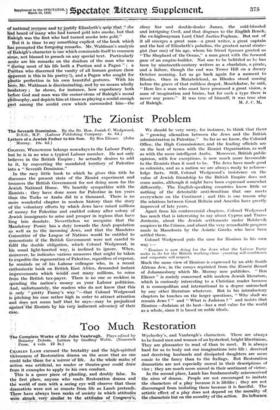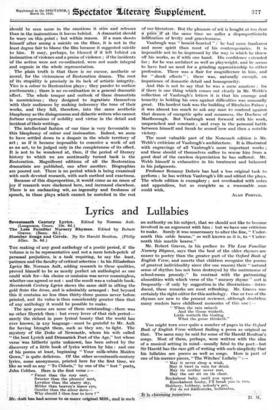Too Much Restoration
The Complete Works of Sir John Vanbrugh. Plays edited by Boimmy Dobree. Letters by Geoffrey Webb'. (Nonesuch
Press. 4 vols. £3 3s.)
ClAni.r.s LAMB -excused-the brutality and-- the -high-spirited Viciousness of Restoration drama on the score that no one could take therif fot mirror "Of life. As.the Whole Malm'Of action was artificial, no reader or theatre-goer could dravi from it examples to apply to his own conduct.
This is a queer piece of pleading, and doubly false. In the first place, anyone who reads Restoration drama and the world of men with a seeing eye will observe that these dramatists were not so remote from life as Lamb Pretends: There have always been ranks of society in which attitudes Were struck . very similar . to the attitudes of Congreve%
Wycherley's, and Vanbrugh's characters. There are always to be found men and women of an hysterical, bright libertinism. They are pleasanter to read of than to meet. It is always hard for us to body out our imaginations into life : deceived and deceiving husbands and dissipated daughters are more comic to the fancy than to the feelings. But Restoration dramatists are not especially unreal in their descriptions of vice ; they are much more unreal in their sentiment of virtue.
In the second place, Lamb has fundamentally misconceived the aims of drama. People are not encouraged to imitate the characters of a. play because it is lifelike ; they are not discouraged from imitating them" because it is fanciful. The artistic effect of a play does not depend on the morality of, the characters but on the morality of the action. Its influence, Should be seen more in the emotions it stirs and releases than in the insinuations it leaves behind. A dramatist should be wary on this points but within reason. If a man shoots himself after seeing a suicide on the films, it is not in the least degree fair to blame the film because it suggested suicide to him. It may, perhaps, be, blamed if it left behind an insinuation of violence and a praise of violence ; if the incidents of the action were not co-ordinated, were not made integral and organic in the whole representation.
The plain truth is that there is no excuse, aesthetic or moral, for the viciousness of Restoration drama. The root of its stupidity is precisely in its lack of artistic integrity Vice is a colour to Restoration plays ; they pander to surface excitements ; there is no co-ordination in a general dramatic effect. The whole temper and outlook of these dramatists is meretricious ; they designed to ingratiate themselves with their audiences by making indecency the tone of their works, and they fall, therefore, into the = same aesthetic blasphemy as the disingenuous and didactic writers who cannot forbear expressions of nobility and virtue 'in the detail and incident of their writings. .
The intellectual fashion of our time is very favourable to this blasphemy of colour and insinuation. Indeed, we seem to have settled down to a despair in the whole territory of art ; as if it became impossible to conceive a work of art as an act, to be judged only in the completeness of its effect. It is not to be wondered at, then, if the period of literary history to which we are continually turned back is the Restoration. Magnificent editions of all the Restoration dramatists are published, one after .another. Biographies are poured out. There is no period which is being examined with such devoted research, with such method and exactness.
Because of this disproportion, it would-come as an omen of joy if research were slackened here, and increased elsewhere. There is an enchanting wit, an ingenuity and freshness of speech, in these plays which cannot be matched in the rest of our literature. But the pleasure Of wit is bought at too dear a price if at- the same time we suffer a disproportiOnate . - infiltration of levity 'and`gmcelessne'ss. '
Vanbrugh was " honelt-hearted " he had more frankness and more spirit than most of his contemporaries. It is impossible not to be_ impressed by the way in which he threw off his works, as if with one hand His confidence extended far ; for he was architect as well as playwright, and he seems to have had no need for a grinding apprenticeship to either profession. There was a flair for magnificence in him, and for " shock effects " ; there was, naturally enough, an impatience of domestic detail and homogeneity.
And this is not to say that he was a mere amateur ; for if there is one thing which comes out clearly in Mr. IVebb's collection of Vanbrugh's letters it is that his courage and tenacity in holding his own against difficulties was unusually great. His hardest task was the building of Blenheim Palace ; it was almost too much to ask any man to contend against that demon of energetic spite and meanness, the Duchess of Marlborough. But Vanbrugh went forward with his work, unquenched and constant ; and even in the personal battle between himself and Sarah he scoredlow and then a notable victory.
The most valuable part of the Nonesuch edition is Mr. Webb's criticism of Vanbrugh's architecture. It is illustrated with engravings of all Vanbrugh's more important works ; and these should of themselves suffice to rescue him from a good deal of the careless depreciation he has suffered. Mr. Webb himself is exhaustive in his treatment and balanced in his judgments.
Professor Bonamy Dobree has had a less original task to perform ; he has written Vanbrugh's life and edited the plays. The whole edition is exemplary ; not overloaded with notes and appendices, but as complete as a reasonable, man could wish.
ALAN PORTER.



























































 Previous page
Previous page